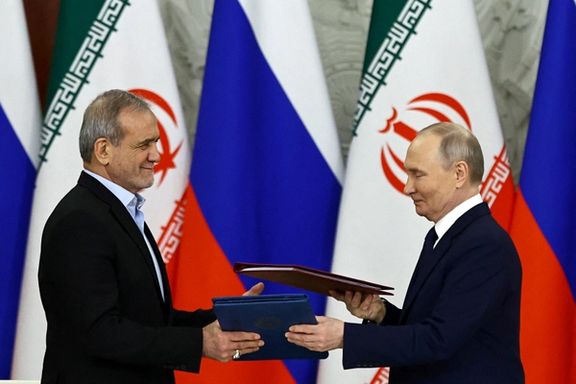Iran’s parliament ratifies 20-year pact with Russia

Iran’s parliament on Wednesday approved a 20-year strategic partnership with Russia, signaling a further tightening of ties between the two countries in both defense and economic matters.

Iran’s parliament on Wednesday approved a 20-year strategic partnership with Russia, signaling a further tightening of ties between the two countries in both defense and economic matters.
The bill passed with 191 votes in favor, 8 against, and 2 abstentions out of 201 ballots cast, according to state media.
The agreement, initially signed by Russian President Vladimir Putin and Iranian President Masoud Pezeshkian on January 17, was ratified by Russia’s State Duma in April.
While the pact does not include a mutual defense clause, it commits both nations to enhanced military-technical cooperation, joint military exercises, and coordination in the face of what they define as shared security threats.
“The strategic treaty is vital from economic, security, geopolitical, and diplomatic perspectives,” said Tehran lawmaker Hamid Rasai during the parliamentary debate. “Both Iran and Russia are under heavy Western sanctions. This partnership can help reduce dependence on the dollar and strengthen national and military security.”
Rasai added that Russia could potentially provide Iran with advanced weapons systems, including air defense technologies, fighter jets, and naval equipment.
Another MP, Mohammad Reza Ahmadi from Rasht, voiced support for the pact, saying, “It is in our interest to align with those who oppose America.”
The development comes against the backdrop of deepening military collaboration since the outbreak of the Ukraine war in 2022.
Western governments have accused Iran of supplying drones and missiles for Russia’s use on the battlefield, leading to economic sanctions, a charge Tehran has consistently denied.
Economically, the pact aims to ease bilateral trade and financial transactions, with provisions to expand interbank cooperation and promote the use of national financial instruments.
The move comes as both Tehran and Moscow remain under extensive Western sanctions.
Last week, a separate free trade agreement between Iran and the Russia-led Eurasian Economic Union came into effect, reducing tariffs to boost trade flows between the two economies.